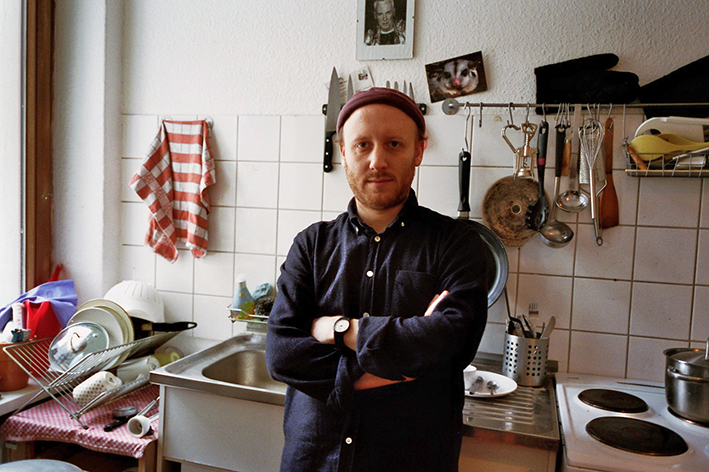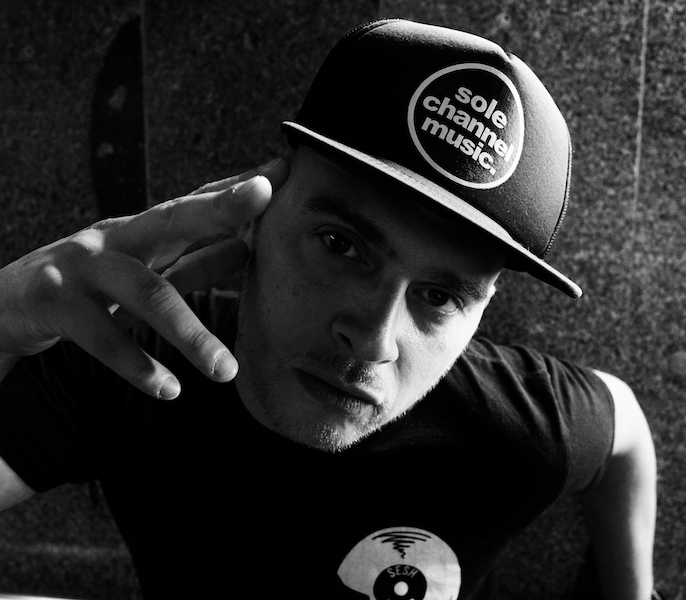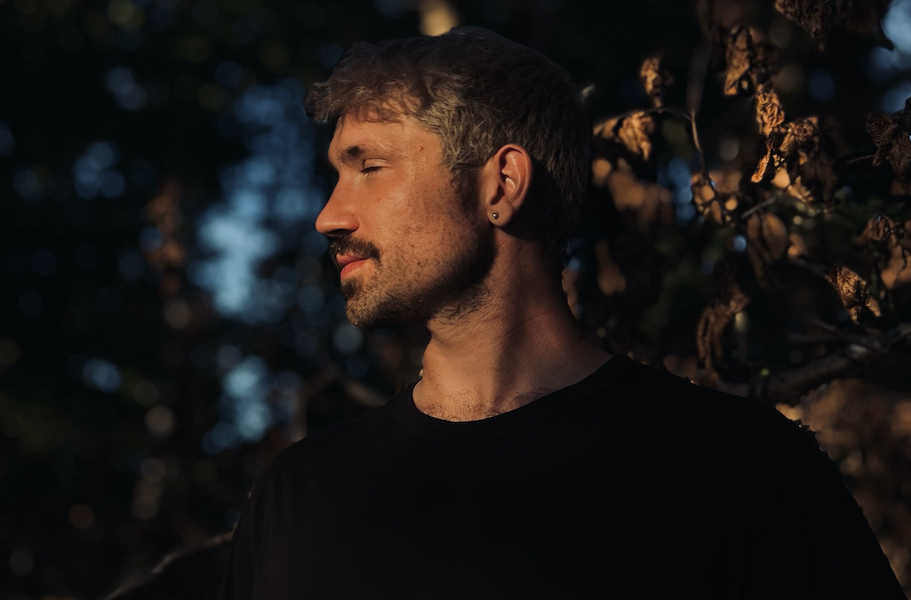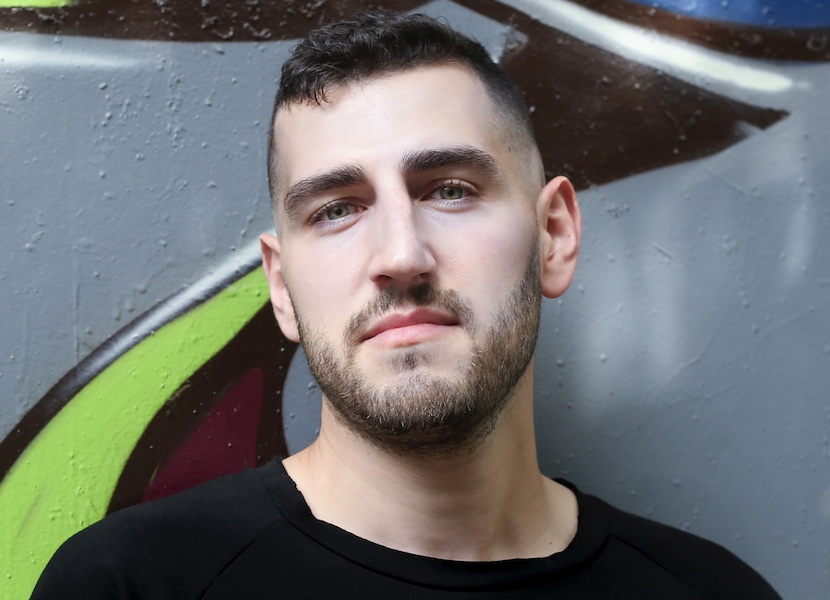Johannes Albert hails from a small town in southern Germany who received his musical education between weekly radio shows and his local record store. With a career spanning many years and a variety of alias’s Johannes has shown that whatever genre or style of music he dips his hand into he is right up there with the best of them. He runs two labels and has released an array of records. I first happened upon Johannes in Renate in Berlin when he was playing an acid set under is HNS-X alias and was determined to find out more. As such we are very proud to present this interview with the man himself along with a set under his HNS-X moniker.
WWD: So, you are originally from Würzburg? Sorry I’m sure I butchered the pronunciation of that my German is terrible.
Johannes Albert: Well, actually I am from an even smaller town like 40km away and there is maybe only like 20,000 people living there. But the biggest thing about that town is that there is a train line running from there to Frankfurt. Back in the day Frankfurt was the big city for club culture and music in general. Like you had all these guys like Sven Vath etc. I think Frankfurt back then was even bigger than Berlin is now.
We also had this radio show which was our Saturday treatment for finding out about new music. It was three hours of techno & house or whatever and we used to record it on the radio to be able to listen back later. But I don’t feel like I grew up in the most music place I suppose.
WWD: So that connection that you had with Frankfurt was it there that you had your first club experiences and first experienced club culture?
Johannes Albert: No that would have been more like Würzburg, after hearing that music on the radio we wanted to go but Frankfurt was still like an hour away and Würzburg was not as far. We had this club back in the day in Würzburg called Airport. For the region it was really important, like people drove from all around the area. On Fridays, they had house music and on Saturdays they had Techno.
I became a regular for the Friday nights and I think almost every Friday for a number of years. I remember there was a resident dj there called Ralph Gum who is actually really big in South Africa now because he plays a lot of really soulful house music. Like really classic vocal house music. But back then I suppose it was a pretty small scene but then every week we had this guy (Ralph) who would show us good music every week. So I would say that was where I first got hooked on that classic house stuff, like right at the end of the ‘90’s and the early 2000’s.
WWD: You mentioned how you used to record the radio stations that were on every Saturday and that seems to be a common theme for a lot of electronic musicians and dj’s. Like you have guys like Moodyman who always mentions the mysterious Magic Mojo in Detroit and you have the pirate radio stations in NYC and then people like Skream who sort of cut his teeth with pirate radio in London. Do you think those radio shows were instrumental in shaping your musical tastes from an early age?
Johannes Albert: Oh, most definitely I would say so yeah! But it was hard to come by back then. Like, you could get some mix cds and stuff like that but what was really played in clubs was what was on those particular radio stations. One very important thing was there was this DJ from Hamburg who did a radio show every weekend and my parents didn’t have digital radio at the time so I would ask friends and people I knew to record the radio show for me so that I could listen to it later. But people used to charge me and my friends and I would fight over it. But he had all of the newest stuff from the states and he had all the vinyl promos. I mean it’s funny to talk about now but back then it was pretty serious.
WWD: That’s Interesting the lengths you had to go to just hear new music in comparison to now when everything is available at the click of a button. Like that struggle that you had to go through to get the music that you wanted was a really interesting thing that you don’t see anymore.
Johannes Albert: yeah like I think it’s great having access to anything but I think its motivation to go even deeper, right? You need to go deeper and deeper and deeper just to get something that the others don’t have. But yeah back then it was just different. I don’t know if it was better or worse but yeah. But one of the biggest things was how long it took for you to get something like you could be waiting to get a record for half a year or something like that. And now it’s totally different where you have a track and you play it for 2-3 weeks and then the next thing comes along. So back then you would play certain records for a much longer time because all the effort you put into getting that record you aren’t just going to stop playing it after 3 weeks.
WWD: yeah that’s so interesting coming from those times where you had to put so much effort into just getting new music whereas now with camera phones etc. if you play a track in a club and it goes off then the next day it can be online with thousands of people finding out what it is.
Johannes Albert: Yeah, it’s crazy you know it was almost like a hunt back in the day. But it’s hard to imagine now but back when I was younger in the town where I was living a small record shop opened called Swing King. So, this is where I first started to get records. But I remember they were going to Frankfurt in their little car to pick up records from the distributers once a week and when they would get back in the evenings there would be a line of people waiting to get the new records. so with some of the bigger records they may only have 2 or 3 copies so it would be in high demand but it was pretty strict like there was a bit of a system. If you were in the shop a lot and the guys knew you then they may keep the record and give it to you and if you weren’t a good customer then, sorry maybe next week.
WWD: And do you still collect records today? Do you have a big record collection?
Johannes Albert: Yeah, it’s ok but it’s not that big. Maybe 2,000-3,000. But before I went through a lot of different phases where I would buy up a lot of different types of house music. You know like French house and these kind of tribal/African/Latin house tracks. Then at some point you realise that you don’t need all of these so I think I might have given away a lot of Latin house records that I didn’t need anymore. But nowadays I still buy all the new records but I’m not super into it. You know I’m not going to tiny villages with a car digging in random basement looking for records. But for me coming from a situation where there was only one little record shop to now where I can walk to a bunch of great record shops it’s like paradise so I am really happy.
WWD: When did you decide to move to Berlin?
Johannes Albert: I moved to berlin after I finished my studies in university. So, in April 2010 I made the move to Berlin.
WWD: And that was at the time when Berlin was really coming into its own in terms of its reputation within the global party scene right? Like that was around the time when you started getting people from outside of Germany specifically coming to Berlin because of the reputation of its clubs and music etc.
Johannes Albert: Yeah you know there was a famous saying by a dj called Westbam who said, “Back in the day we used to book people from other countries to play for a Berlin crowd, and now it is the exact opposite, you now have people coming from all over the world to hear people from Berlin playing”. But it’s so true like every night there is such an international crowd.
WWD: What was Berlin like when you first moved there?
Johannes Albert: you know I had been there a lot before I moved here because some friends of mine had moved to Berlin a few years before. So, I was in berlin maybe twice a week for a couple of years before I actually made the move. But right when I moved it was in the heyday of a very famous afterhours spot called Bar 25. Where they would have parties that would go on for four days. Right into Tuesday afternoon. But yeah Berlin was on the map but it wasn’t this massive international party spot. At that time, I also released my first record on a Berlin label, so there were a couple of different reasons for the decision, like I had also gotten a job here so there were many reasons. I actually just quit my day job to focus on music fulltime, so it took me seven years to finally quit my job and just give everything to music.
WWD: Wow it took you seven years to finally take the plunge and do music full time?!
Johannes Albert: Yeah, I quit my job just two months ago. But I always like to play it safe you know? Like I was always able to have a job and do the label on the side and then play shows at the weekends. But the good thing is that I never had any money troubles and for me running the label wasn’t about the money I just wanted to release good music and see what happens. But it got to the stage where I would be sitting in the office in my job and I would get some inspiration to make some music or a certain beat or whatever and then by the time I get home in the evening that feeling is gone. So now I want to be able to go to the studio after I wake up and go make music whenever I feel like it and see what happens.
WWD: So, you started buying records in Swing King, how soon after that did mixing records and being a dj become of interest to you?
Johannes Albert: It happened kind of fast, the guys from the record shop they really were really kind and nice and they thought me how to mix records in the shop. I actually can still remember the day when I got my grandpa to drive me to the record shop to pick up my very first set of turntables. But I think I got really lucky because those guys in the record shop they were older than me and they were really cool and I don’t know if they saw something in me or if they just liked me but they really helped by teaching me how to mix and by giving me good records etc. One year after the shop opened actually they had a one year anniversary party in a local club and this is actually where I had my first dj set. But yeah even the greatest thing is that I am still friends with all of those guys, like I will be at one of their weddings in a couple of weeks.
WWD: Then how long after you started djing did you get into production?
Johannes Albert: For a long time I was only collection and playing records, maybe for as long as ten years until I really got into production. I mean I tried it several times over those ten years but it just seemed like so much work to learn how to use all of these different systems at the time. You know I would try and then after two hours I would think that I just couldn’t do that so I would stop for another while. Because also at the time I was a really big fan of the masters at work records and I thought that the music was made in these amazing studios and so I thought that I would never be able to get my music up to that level. But eventually I came back to it and slowly but surely, I began to get better and better at it until I was eventually at the stage where I was happy with what I was making and eventually wanted to release it.
WWD: So, you start producing music, how soon after did you develop these different alias’s and why?
Johannes Albert: Maybe like three or four years ago. But for me I always like a lot of different styles and so I wanted to try some other things and so that is how my HNS-X alias came about because I wanted to give people out there something different to listen to and see how it goes. But I think people always have an idea of what they can expect from a producer. Like you see an artists’ name and you can automatically assume what it is going to sound like and so by using a different name I wanted to potentially reach some different listeners. At the same time, I wanted to see what peoples’ reactions would be to a record that they didn’t know who the artist is like what they used to do with white labels back in the day. But for the most part it is just me having fun to have all of these different alias’. But I also feel that if a producer releases tracks of different genres under the same name all of the time it can get pretty confusing you know? So, I think that this can start to work against the artist eventually.
WWD: So that HNS_X record was your first release under a new alias, how was it received?
Johannes Albert: Honestly I didn’t receive that much feedback about it. It was very under the radar. Because at the time there was zero online presence for that alias so people had no idea who was to blame for that record. Then at some stage I think Joy O played it at some festival and it started to get a lot more attention because of that.
WWD: Then there is your other alias, the duo between you and Iron Curtis as Moon. How did that come about?
Johannes Albert: Well it’s funny his real name is actually Johannes as well and we are both from the same area but we only met in Berlin. I also think we have very similar taste when it comes to making and listening to music. Then much more importantly on a personal level we are very similar and we get on very well. We actually used to be neighbours in the same house and I would always hear him making beats in the room above mine so after a while I eventually got curious and we started talking and that was kind of the beginning of it.
WWD: You mentioned you also run a couple of labels. How did they come about?
Johannes Albert: Frank Music I started in like 2011. I had released records on other labels before this and it seemed like a really cool process and so I wanted to go through the whole thing myself from making the track to getting the test pressing to eventually releasing it. But the funny thing is that I didn’t plan to start a label it was just a case of wanting to do a record from start to finish. But then eventually we had released a number of records and we kind of decided that this had become a label even if we didn’t mean it. But even after releasing so many records I still get excited about the whole process. But I believe that vinyl is still the purest way to listen to music. If you like digital that’s cool, I mean it’s the same music and you can feel the same way about it. But when you have that record in your hands it’s just different. You can touch it and smell it and whatever.
WWD: So you aren’t one of these dj’s who are on a campaign to destroy digital?
Johannes Albert: No, I got bored of this discussion a long time ago. Like there was a period where I believed that records were more important but I wouldn’t get into fights with people about it. For me I like to go to the record shop every week and I like to play records but sometimes you know you just can’t play records for whatever reason and I just want to put on the best show I can and play music in the best possible way and sometimes that is just digital. But most of all I don’t want to be this old fool who only plays vinyl you know?
Questions by G. Lewis






